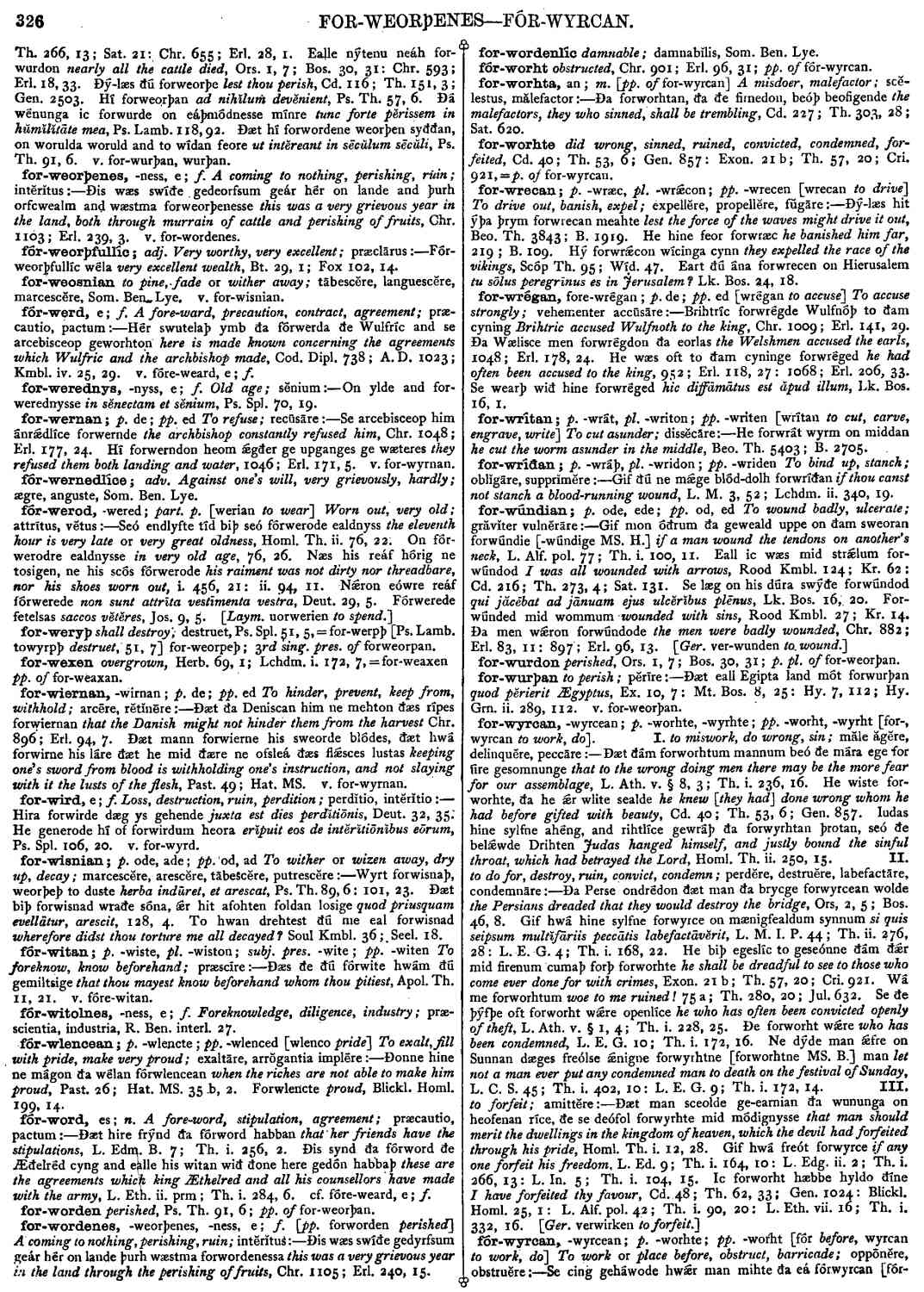for-wyrcan
- verb [ weak ]
-
Ðæt ðam forworhtum mannum beo ðe mára ege for úre gesomnunge
that to the wrong doing men there may be the more fear for our assemblage,
- L. Ath. v. § 8, 3 ;
- Th. i. 236, 16.
-
He wiste forworhte, ða he ǽr wlite sealde
he knew [they had] done wrong whom he had before gifted with beauty,
- Cd. 40 ;
- Th. 53, 6 ;
- Gen. 857.
-
Iudas hine sylfne aheng, and rihtlíce gewráþ ða forwyrhtan þrotan, seó ðe belǽwde Drihten
Judas hanged himself, and justly bound the sinful throat, which had betrayed the Lord,
- Homl. Th. ii. 250, 15.
-
Ða Perse ondrédon ðæt man ða brycge forwyrcean wolde
the Persians dreaded that they would destroy the bridge.
- Ors. 2, 5 ;
- Bos. 46, 8.
-
Gif hwá hine sylfne forwyrce on mænigfealdum synnum
si quis seipsum multĭfāriis peccātis labefactāvĕrit,
- L. M. I. P. 44 ;
- Th. ii. 276, 28: L. E. G. 4 ;
- Th. i. 168, 22.
-
He biþ egeslíc to geseónne ðam ðǽr mid firenum cumaþ forþ forworhte
he shall be dreadful to see to those who come ever done for with crimes,
- Exon. 21 b ;
- Th. 57, 20 ;
- Cri. 921.
-
Wá me forworhtum
woe to me ruined!
- 75 a ;
- Th. 280, 20 ;
- Jul. 632.
-
Se ðe þýfþe oft forworht wǽre openlíce
he who has often been convicted openly of theft,
- L. Ath. v. § 1, 4 ;
- Th. i. 228, 25.
-
Ðe forworht wǽre
who has been condemned,
- L. E. G. 10 ;
- Th. i. 172, 16.
-
Ne dýde man ǽfre on Sunnan dæges freólse ǽnigne forwythtne [forworhtne MS. B.] man
let not a man ever put any condemned man to death on the festival of Sunday,
- L. C. S. 45 ;
- Th. i. 402, 10: L. E. G. 9 ;
- Th. i. 172, 14.
-
Ðæt man sceolde ge-earnian ða wununga on heofenan ríce, ðe se deófol forwyrhte mid módignysse
that man should merit the dwellings in the kingdom of heaven, which the devil had forfeited through his pride,
- Homl. Th. i. 12, 28.
-
Gif hwá freót forwyrce
if any one forfeit his freedom,
- L. Ed. 9 ;
- Th. i. 164, 10: L. Edg. ii. 2 ;
- Th. i. 266, 13: L. In. 5 ;
- Th. i. 104, 15.
-
Ic forworht hæbbe hyldo ðine
I have forfeited thy favour,
- Cd. 48 ;
- Th. 62, 3 ;
- Gen. 1024: Blickl. Homl. 25, 1: L. Alf. pol. 42 ;
- Th. i. 90, 20: L. Eth. vii. 16 ;
- Th. i. 332, 16.
Bosworth, Joseph. “for-wyrcan.” In An Anglo-Saxon Dictionary Online, edited by Thomas Northcote Toller, Christ Sean, and Ondřej Tichy. Prague: Faculty of Arts, Charles University, 2014. https://bosworthtoller.com/12035.
Checked: 1